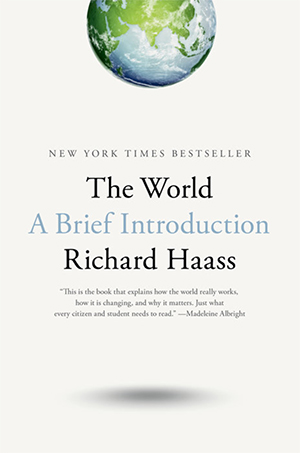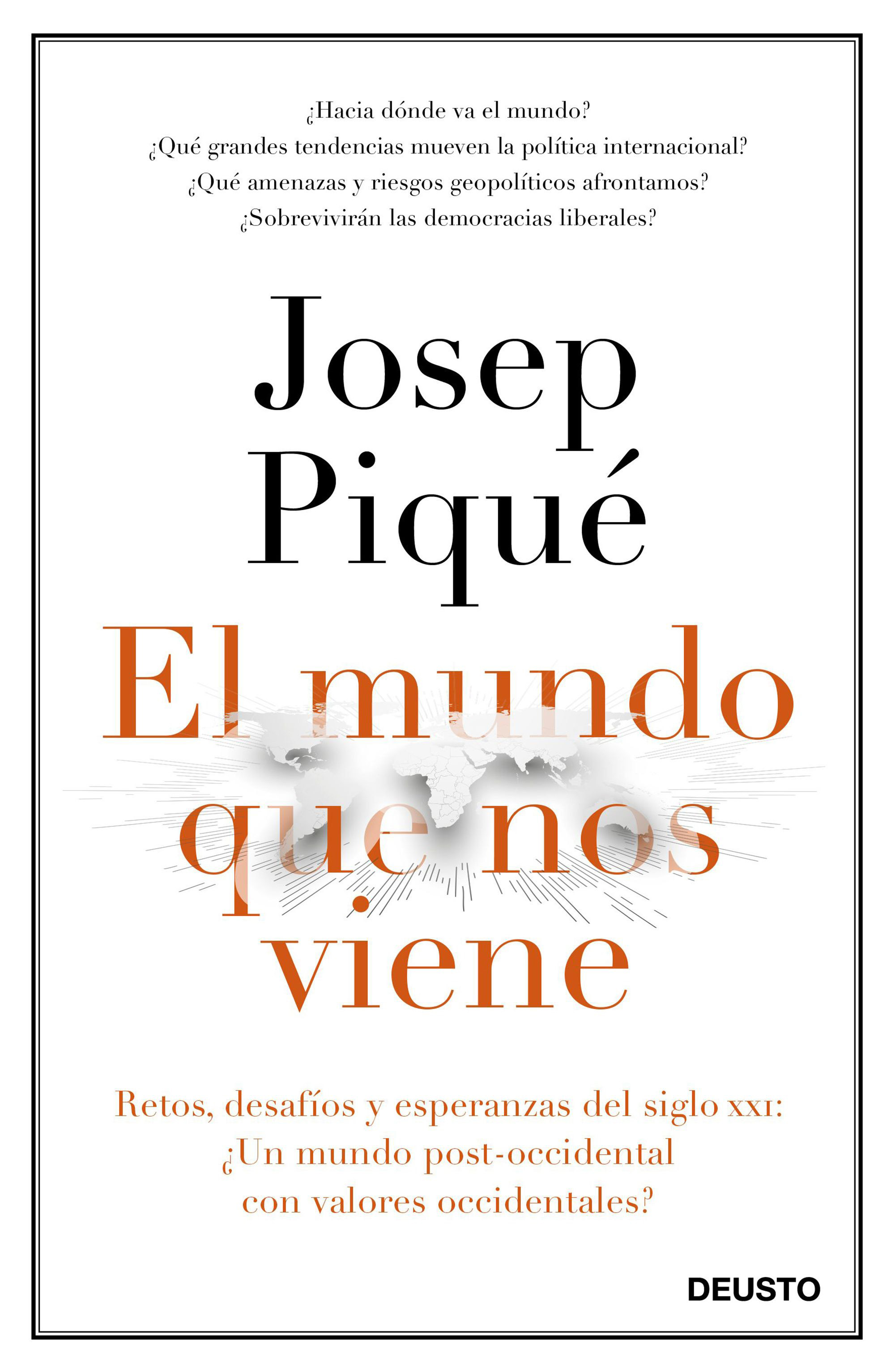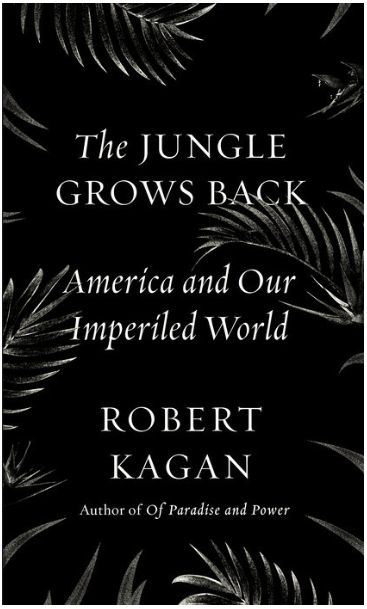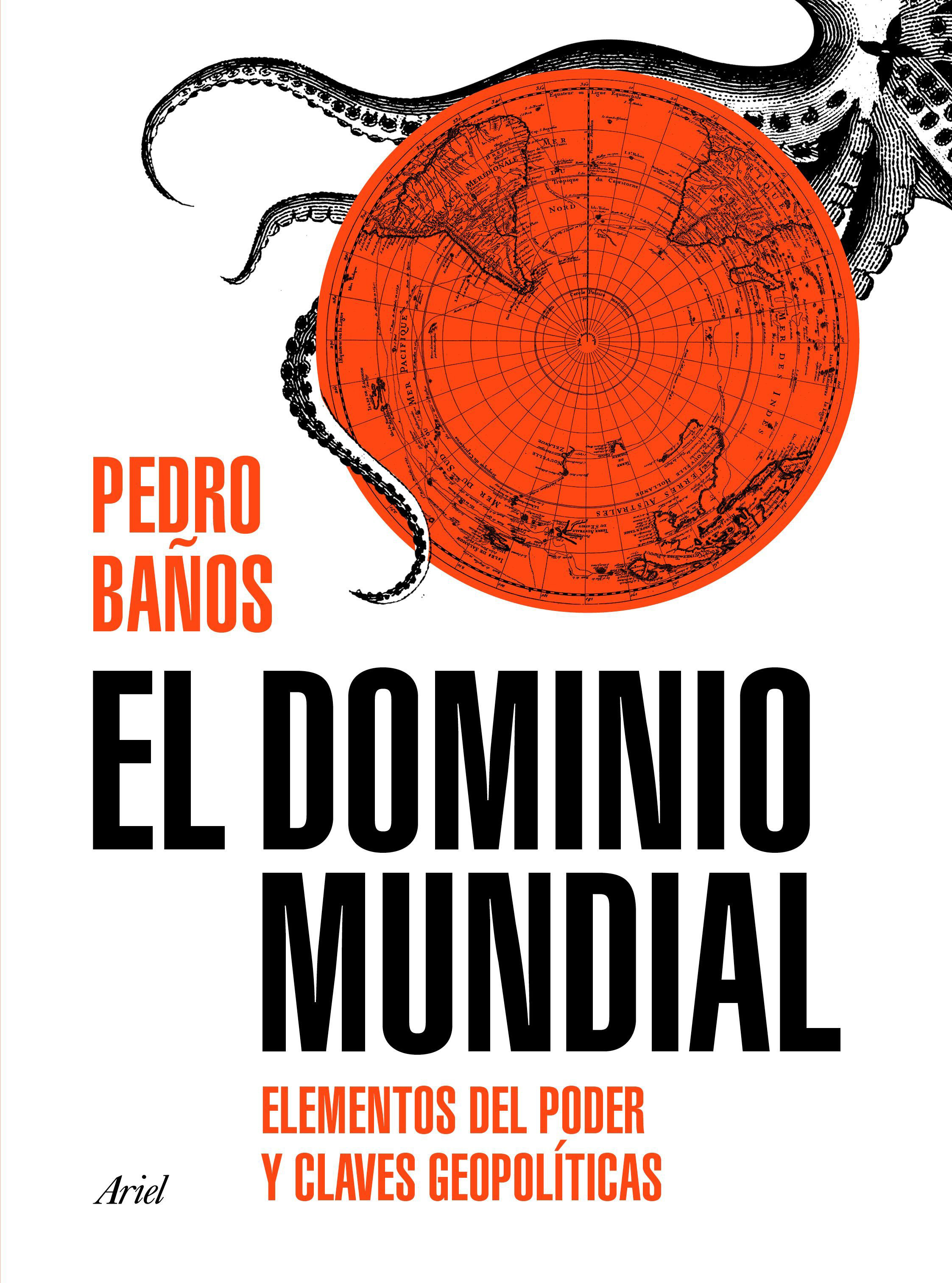Ruta de navegación
Menú de navegación
Blogs
Entries with label world order .
[Richard Haas, The World. A Brief Introduction (New York, NY: Penguin Press, 2020), 378 p].
review / Salvador Sánchez Tapia
 During a fishing workshop on Nantucket with a friend and his son, then a computer engineering student at the prestigious Stanford University, Richard Haass, president of the Council on Foreign Relations, engaged the young man in conversation about his programs of study, and asked him what subjects he had taken, apart from the strictly technical ones. To his surprise, Haass realised how limited issue of these he had taken were. No Economics, no history, no politics.
During a fishing workshop on Nantucket with a friend and his son, then a computer engineering student at the prestigious Stanford University, Richard Haass, president of the Council on Foreign Relations, engaged the young man in conversation about his programs of study, and asked him what subjects he had taken, apart from the strictly technical ones. To his surprise, Haass realised how limited issue of these he had taken were. No Economics, no history, no politics.
Richard Haass uses this anecdote, which he refers to in the introduction to The World. Education A Brief Introduction , to illustrate the general state of higher education in the United States - which is, we might add, not very different from that of other countries - and which can be summed up in this reality: many students in the country that has the best universities in the world, and which is also the most powerful and influential on the planet, which means that its interests are global, can finish their university-level training without a minimal knowledge - let alone understanding - of the world around them, and of its dynamics and workings.
The World. A Brief Introduction is a direct consequence of the author's concern about the seriousness of this important gap for a nation like the United States, and in today's world, where what he calls the "Las Vegas rule" - what happens in the country stays in the country - does not work, given the interconnectedness that results from an omnipresent globalisation that cannot be ignored.
The book is conceived as a basic guide intended to educate readers - hopefully including at least some of the plethora of uneducated students - of different backgrounds and levels of knowledge, on the basic issues and concepts commonly used in the field of International Office.
By the very nature of the work, informed readers should not expect to find in this book any great discoveries, revolutionary theories or novel approaches to contemplate the international order from a new perspective. Instead, what it offers is a systematic presentation of the essential concepts of this field of knowledge that straddles history, political science, sociology, law and geography.
The book avoids any theoretical approach. On the contrary, its goal is eminently practical, and its aim is none other than to present in an orderly and systematic way the information that the average reader needs to know about the world in order to form a criterion of how it works and how it is articulated. It is, in final, to make him or her more "globally educated".
From his vantage point as president of one of the world's leading global think-tanks, and with the experience gained from his years of service as part of the security establishment of the two Bush presidents, Richard Haass has made numerous important contributions to the field of International Office. In the case of the present book, the author's merit lies in the effort he has made to simplify the complexity inherent in International Office. In a simple and attractive prose, accessible to readers of all subject, Richard Haass, demonstrating a great understanding of each of the subjects he deals with, has managed to distil their essence and capture it in the twenty-six chapters of this brief compendium, each of which would justify, on its own, an enormous literary production.
Although each chapter can be read independently, the book is divided into four parts in which the author approaches status the current world and relations between states from different angles. In the first part, Haass introduces the minimum historical framework necessary to understand the configuration of the current international system, focusing in particular on the milestones of the Peace of Westphalia, the two World Wars, the Cold War, and the post-Cold War world.
The second part of the book devotes chapters to different regions of the world, which are briefly analysed from a geopolitical point of view. For each region, the book describes its status, and analyses the main challenges it faces, concluding with a look at its future. The chapter is comprehensive, although the regional division it employs for the analysis is somewhat questionable, and although it inexplicably omits any reference letter to the Arctic as a region with its own geopolitical identity and set to play a growing role in the globalised world to which the book constantly alludes.
The third part of the book is devoted to globalisation as a defining and inescapable phenomenon of the current era with an enormous impact on the stability of the international order. In several chapters, it reviews the multiple manifestations of globalisation - terrorism, nuclear proliferation, climate change, migration, cyberspace, health, international trade, monetary issues, and development- describing in each case its causes and consequences, as well as the options available at all levels to deal with them in a way that is favourable to the stability of the world order.
Finally, the last section deals with world order - the most basic concept in International Office- which it considers indispensable given that its absence translates into loss of life and resources, and threats to freedom and prosperity at the global level. Building on the idea that, at any historical moment, and at any level, forces that promote stable order operate alongside forces that tend towards chaos, the chapter looks at the main sources of stability, analysing their contribution to international order - or disorder - and concluding with what this means for the international era we live in. Aspects such as sovereignty, the balance of power, alliances and war are dealt with in the different chapters that comprise this fourth and final part.
Of particular interest to those who wish to delve deeper into these matters is the coda of the book, entitled Where to Go for More. This final chapter offers the reader a well-balanced and authoritative compendium of journalistic, digital and literary references whose frequent use, highly recommended, will undoubtedly contribute to the educational goal proposed by the author.
It is an informative book, written to improve the training of the American and, beyond that, the global public on issues related to the world order. This didactic nature does not, however, prevent Haass, at times, and despite his promise to provide independent, non-partisan criteria that will make the reader less manipulable, from tinginging these issues with his staff vision of the world order and how it should be, or from criticising - somewhat veiled, it must be said - the current occupant of the White House's international policy, which is not very globalist. Nevertheless, The World. A Brief Introduction offers a simple and complete introduction to the world of International Office, and is almost obligatory reading for anyone who wants to get started in the knowledge of the world order and the mechanisms that regulate it.
[Josep Piqué. The world that is coming to us. Challenges, Challenges and Expectations of the 21st Century: A Post-Western World with Western Values? Deusto. Barcelona, 2018. 254 pp.]
review / Ignacio Yárnoz
 |
Europe may lose relative economic weight or, worse, demographic weight and competitiveness, putting the sustainability of its welfare state at risk. It may become less and less relevant on the global geopolitical stage and move away from the planet's new center of gravity. However, it remains an indisputable pole of attraction for the rest of humanity due to its peace, democracy, freedom, gender equality and opportunities, tolerance and respect. This is what the author Josep Piqué wants to convey to us in The World That Comes to Us. We are talking about an economist, businessman and political leader – head of several ministries, including Foreign Affairs, during the government of José María Aznar – who has experienced first-hand the transition from a Eurocentric world to one that looks more to a thriving Asia.
The work turns out to be a good geopolitical analysis of the world, in which a fragmented European Union, a very thriving China, a Russia nostalgic for its imperial past, a Middle East divided in wars between irreconcilable factions and an Anglo-Saxon world withdrawn into itself stand out. I divide it into different chapters depending on the area geographically, the book takes an in-depth look at each and every topic.
First of all, the author emphasizes the status that the Anglo-Saxon world is experiencing, especially the United States and the United Kingdom, countries that have renounced their world hegemony for the sake of a retreat into themselves. In the case of the United Kingdom, we talk about the divorce from the European Union, and in the case of the United States, we talk about President Donald Trump's policies, such as the withdrawal of the TPP (Trans Pacific Partnership) with Japan, Chile, Canada, Australia, Brunei, New Zealand, Mexico, Peru, Malaysia, Vietnam and Singapore. Paradoxically, in the face of the attitude of these two actors, there is the rise as a power of a China that no longer dissembles in its actions, that no longer wants to be that silent power that Deng Xiaoping formulated.
Russia and its actions abroad are also subject to analysis from different perspectives, but mainly in light of Russia's obsession with its security. As the author argues, it is a state that is very sensitive to its borders and tries to keep the enemy poles as far apart as possible, which implies a policy of influence in the states bordering its border. This explains their reactions to the change of sides of the Eastern European countries and their gradual incorporation into the European Union or NATO. Nor can we forget the topic of gas, the implications of the melting of the Arctic, the oil deposits in the Caspian Sea or other issues that the author reviews.
If we look at the picture in the Middle East, the status It does not seem to be reaching a lasting peace. Neither in the panorama of the Palestinian-Israeli conflict, nor in the different proxy wars between Iran and Saudi Arabia, not to mention the failure of the different Arab Springs. This status It leads the author to analyze in historical perspective how all this has happened. On the other hand, it analyzes the complexity of the different intersecting interests between Turkey, Syria, Russia, Saudi Arabia and Iran that complete the chessboard represented by the Middle East.
Finally, we must not forget the chapter that Josep Piqué reservation for your thesis at the beginning of this article. article: the future of the European Union. As he himself points out, Europe represents the neo-Western synthesis in a post-Western world. However, you need to realize this potential and benefit from it. As Piqué argues, the attractiveness of the European Union as much as project inclusive as well as the liberal and democratic values it represents must be a card that the EU must play more in its favour. However, it also faces challenges such as the rise of nationalism and anti-Europeanism, Russian interference in internal affairs and the lack of credibility of the European institutions. All of this in the framework of the severe economic recession of 2007, which the author also analyzes as a good economist of degree program. Finally, we must not forget some final notes dedicated to the implications of new technologies, Latin America and the opportunities that Spain has.
All of this together represents a complete journey through the world of geostrategy – in the review of the regions of the planet, only one is missing. accredited specialization to Africa – which details all the keys that a person with an interest in international relations should take into account when analysing current affairs.
[Robert Kagan, The Jungle Grows Back. America and Our Imperiled World. Alfred A. Knoff. New York, 2018. 179 p.]
review / Emili J. Blasco
 |
At this point in the century, it is already clear that the consecration of the liberal system in the world, after the breakup of the communist bloc at the end of the Cold War, is not something that will happen inexorably, as was thought. It's not even likely. The divergent models of China and Russia are gaining traction. Democracy is in retreat, even in Western societies themselves.
It is the jungle that grows again where a garden had been extended. This is the image that Robert Kagan uses in his new book to warn about the desirability of the United States not shirking its responsibility to lead the effort to preserve the liberal world order. For Kagan, the liberal system "was never a natural phenomenon," but a "great historical aberration." "It has been an anomaly in the history of human existence. The liberal world order is fragile and not permanent. Like a garden, it is always besieged by the natural forces of history, the jungle, whose vines and weeds constantly threaten to cover it," he says. It is an "artificial creation subject to the forces of geopolitical inertia," so that the question "is not what will bring down the liberal order, but what can sustain it."
Kagan is outlived in the media by the label He is a neoconservative, although his positions are in the central current of American Republicanism (majority for decades, until the rise of Donald Trump; in fact, in the 2016 campaign Kagan supported Hillary Clinton) and his work is developed at the rather Democratic Brookings Institution. He does defend clear U.S. leadership in the world, but not out of self-assertion, but as the only way for the liberal international order to be preserved. It is not that, by sponsoring it, the United States has acted disinterestedly, because as one of its builders, Secretary of State Dean Acheson, said, in order to protect the "American experiment in life" it was necessary to create "an environment of freedom" in the world. But the other Western countries, and others where the regime of freedoms of democratic societies has also been extended, have also benefited.
The thesis Kagan's central point is that, although there was America's own interest in creating the international architecture that ordered the world after World War II, it benefited many other countries and guaranteed the victory of free societies over communism. Crucial to this, according to Kagan, is that while Washington at times acted against the values it preached, it generally played by certain rules.
Thus, the U.S. "did not exploit the system it dominated to gain lasting economic advantages at the expense of the other powers of order. Put simply: he could not use his military dominance to win the economic competition against other members of the order, nor could he treat the competition as zero-sum and insist on always winning. It's true that the U.S. benefited from being the main player both economically and militarily, "but an element of core topic to hold the international order together was the perception of the other powers that they had reasonable opportunities to succeed economically and even sometimes surpass the United States, as Japan, Germany, and other nations did at various times."
Kagan admits that Washington's willingness to engage in large doses of fairplay on the economic plane "did not extend to all areas, particularly not to strategic issues." In these, "order was not always based on rules, because when the United States deemed it necessary, rightly or wrongly, it violated the rules, including those it claimed to defend, either by carrying out military interventions without UN authorization, as it did on numerous occasions during the Cold War, or by engaging in covert activities that had no international backing."
It has been an order that, in order to function, "had to enjoy a certain Degree of voluntary acceptance by its members, not to be a competition of all against all, but a community of like-minded nations acting together to preserve a system from which all could benefit." "Order was kept in place because the other members viewed U.S. hegemony as relatively benign and superior to other alternatives." test This is why the countries of Western Europe trusted Washington despite its overwhelming military superiority. "In the end, even if it didn't always do so for idealistic reasons, the United States would end up creating a world unusually conducive to the spread of democracy."
Kagan disagrees with the view that after the dissolution of the USSR, the planet entered a "new world order." In his view, what was called the "unipolar moment" did not actually change the assumptions of the order established at the end of World War II. That is why it made no sense that, with the fall of the Berlin Wall, the world was thought to be entering a new era of unstoppable peace and prosperity, and that this made America's role as a gardener unnecessary. The withdrawal from the world carried out by Trump and initiated by Obama (Kagan already in 2012 published The World America Made, in defense of American involvement in the world), would be allowing the return of the chaotic vegetation of the jungle.
The Jungle Grows Back is in the format of a small book, typical of a essay It is a restrained film that aspires to convey some fundamental ideas without wanting to overwhelm the reader. Despite pointing out the dangers of the liberal order, and noting that the United States is in retreat, the book offers an optimistic message: "This is a pessimistic view of human existence, but it is not a fatalistic view. Nothing is determined, neither the triumph of liberalism nor its defeat."
[Pedro Baños, The World Domain. Elements of power and geopolitical keys. Ariel. Barcelona, 2018. 366 p.]
review / Manuel Lamela
 |
If your previous submission, The Keys to World Domination, served as a guide to introduce us to the vast world of geopolitics and international relations, in his new work, Colonel Pedro Baños Bajo, unveils us and gives us a glimpse of the sample the key elements and instruments for world domination and how these are used by the various actors in their constant struggle for power on a global scale. We are on the verge of a paradigm shift on the international scene, and this process, as the author explains, will be led by demography and technology.
In his business In order to democratize geopolitics, Pedro Baños uses clear and precise language to facilitate the understanding of the work. There will be numerous illustrations present in the book that will be accompanied by brief explanations to get a broader vision of the topic to be treated.
The Elements of World Power is the name given to the first half of the book, it is divided into nine different parts that according to the author are key when it comes to understanding the global power game. In this first half, issues of rigorous relevance and tremendously important on the international scene will be discussed. From the hybrid threat, which represents a new way of waging war, to the role of intelligence services today, to the transcendental importance of natural resources and demographics. It is certainly a fairly comprehensive analysis for those looking for a brief explanation of the greatest challenges that threaten to destabilize our current social order. It is true that some of the explanations can be defined as simple, but this does not have to be understood as a pejorative characteristic. The author's ability to synthesize extremely complex issues can encourage the reader's curiosity and make the leap to other great works where they can delve into more specific topics.
In the second part of the book we find a more concrete analysis in which the author focuses on only two factors: technology and demographics. The population imbalance, the large migratory flows and what some call the fourth industrial revolution are some of the issues that Colonel Baños highlights in his analysis. In the author's opinion, the transformations to which these two elements will be exposed will mark the course of humanity in the coming years. In this more incisive study, the author sample how vulnerable human society is to the future changes that are to come and how this alleged weakness will make conflicts difficult to avoid in the near future. Pedro Baños argues that despite the belief we have of living in a perfectly organized and structured society, the reality is far from the latter, since it is a small group The human being charged with directing and leading the destiny of all humanity as a whole.
Despite distilling a certain pessimism throughout the work, Pedro Baños decides to conclude his analysis with a message of hope, advocating for a united humanity. manager and in solidarity with their environment.
